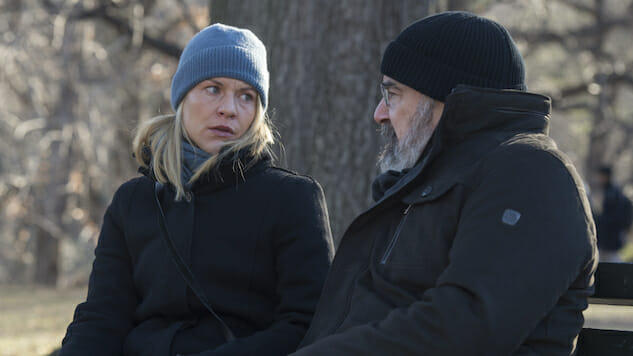Homeland: “Sock Puppets” Is the Best Episode of the Season So Far
(Episode 6.09)
JoJo Whilden/SHOWTIME
“Sock Puppets” opens on Carrie Mathison’s face, and it betrays the wear of what’s happened. The lines on her forehead are deeper now, her complexion rougher, more wan; the tears she’s shed with that distinctive expression, like an aluminum can crushed underfoot, seem to have reworked her muscles. Before we hear, then see, Carrie’s court-appointed therapist, the camera holds her in the center of the frame, and Claire Danes, in a fine feat of acting, manages to suggest the character’s past in the course of one or two minutes: Brody’s death, Franny’s birth, Quinn’s charged, even dangerous, presence. If her description of that long-ago love affair is the mother of all understatements (“We had a relationship that was unusually intense,” she says), though, her current fear is crisply explained. “I can’t lose another one,” she admits, and all the water under the bridge rushes back.
Homeland thus recovers from the season’s weakest entry with its strongest so far, returning to the subject that’s sustained it from the outset: The awful truth that our errors of judgment remain with us forever, even as time itself moves on. Compared to the strained plotting of “Alt.Truth,” “Sock Puppets,” buoyed by its tart, truculent dialogue, seems an organic acceleration of the season’s arc, bringing Carrie and Saul (Mandy Patinkin) back into the president-elect’s orbit. This swift reversal, brought on when Dar Adal (F. Murray Abraham) hands Javadi (Shaun Toub) off to Mossad, is almost an apologia for “Alt.Truth,” and it sets the table for three bracing exchanges—each offering hope that Homeland’s slow simmer might finally come to a boil.
The first, in which Carrie and Saul bring Keane convincing evidence that Iran’s “parallel nuclear program” is a ruse, culminates in Elizabeth Marvel’s sublimely lacerating delivery of “that obsequious little shit!” While Dar’s dissembling—the apparent success of which he celebrates, smugly, before his plan starts to unravel—is the primary fuel for Keane’s fire, it isn’t the only factor; tellingly, she turns on Carrie and Saul, too, implicating our protagonists in the CIA’s cynical logic. “What is it with you people?” she snarls. “The ‘intelligence community’? I mean, who even thinks like this?” (She underscores the point when she corrects Carrie moments later, rightly describing Sekou’s death as a murder.) This is worth noting, if only because Homeland doesn’t appear to be softening the season’s ideological stance in order to draw the characters together for a rousing climax. Carrie and Saul, for whom warrantless surveillance, drone warfare and other tactics of the War on Terror were once justifiable, may be more dovish than Dar and his allies, but that does not erase their collaboration in creating the system they’re now determined to fight.
It is, in fact, “Dar and his fucking cabal” that Carrie, Keane and the future solicitor general discuss in the second exchange, this one a thicket of personal and political loyalties. (“Excuse me.”) Here, “Sock Puppets” dredges up Saul’s relationship with double agent Allison Carr, which Dar brushed under the rug to save his colleague’s career; if Carrie signs an affidavit detailing the cover-up, Dar’s toast—but so, of course, is Saul. Even Keane’s offer of a pardon “down the line” doesn’t assuage Carrie’s conscience.
And so she sets a meeting with her mentor, with whom she shares more than her taste for espionage. The rhythms of their conversation in park, the third and most delicious of the episode’s key exchanges, suggest the debts each owes to the other; the way Saul’s energy dissipates, after he discovers that Carrie’s already spoken to Keane, recalls the ebbs and flows of their entire relationship, shifting from cruel to kind and back again as circumstances change. Homeland, with respect to Brody, was always Carrie and Saul’s story as well, and it’s when they’re on screen together—whether in harmony or at cross-purposes—that the series shines brightest. (Their tarmac encounter in Season Four’s “There’s Something Else Going On” is among Homeland’s most searing sequences.) The meanness of their mutual criticism is built atop a rich, fraught friendship, and as such, the scene possesses a power that runs deeper than the dialogue.
-

-

-

-

-

-

-

-

-

-

-

-

-

-

-

-

-

-

-

-

-

-

-

-

-

-

-

-

-

-

-

-

-

-

-

-

-

-

-

-








































